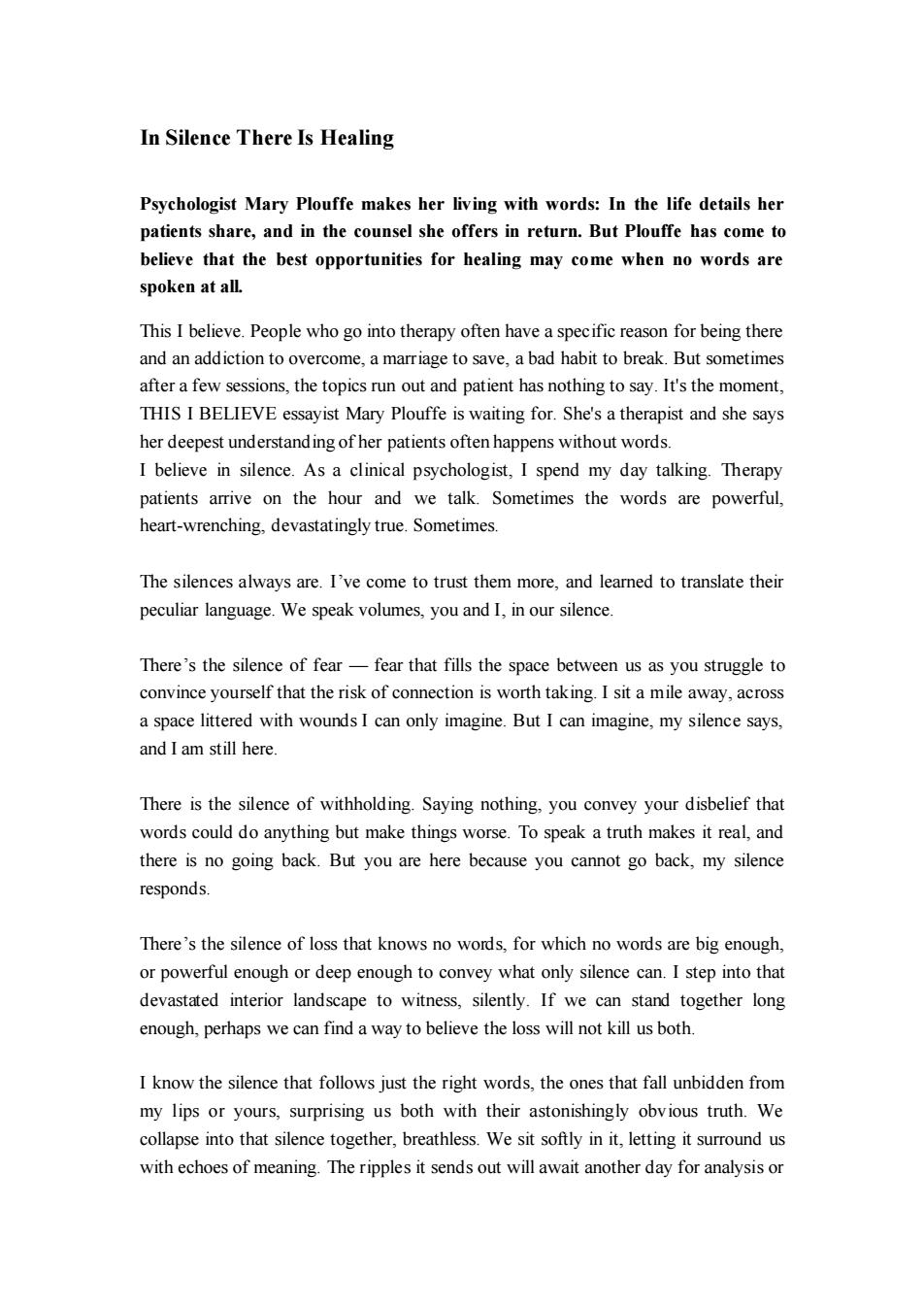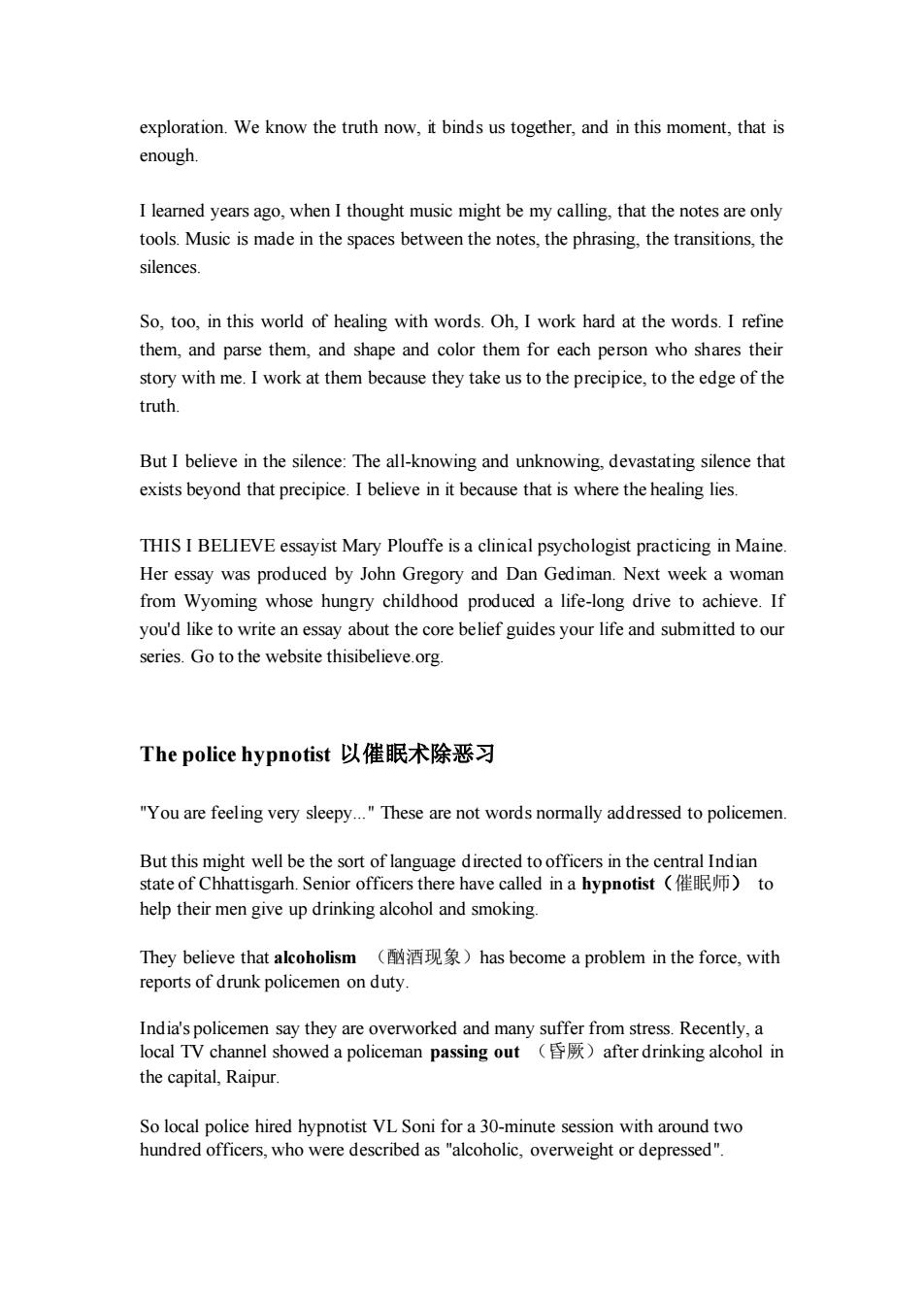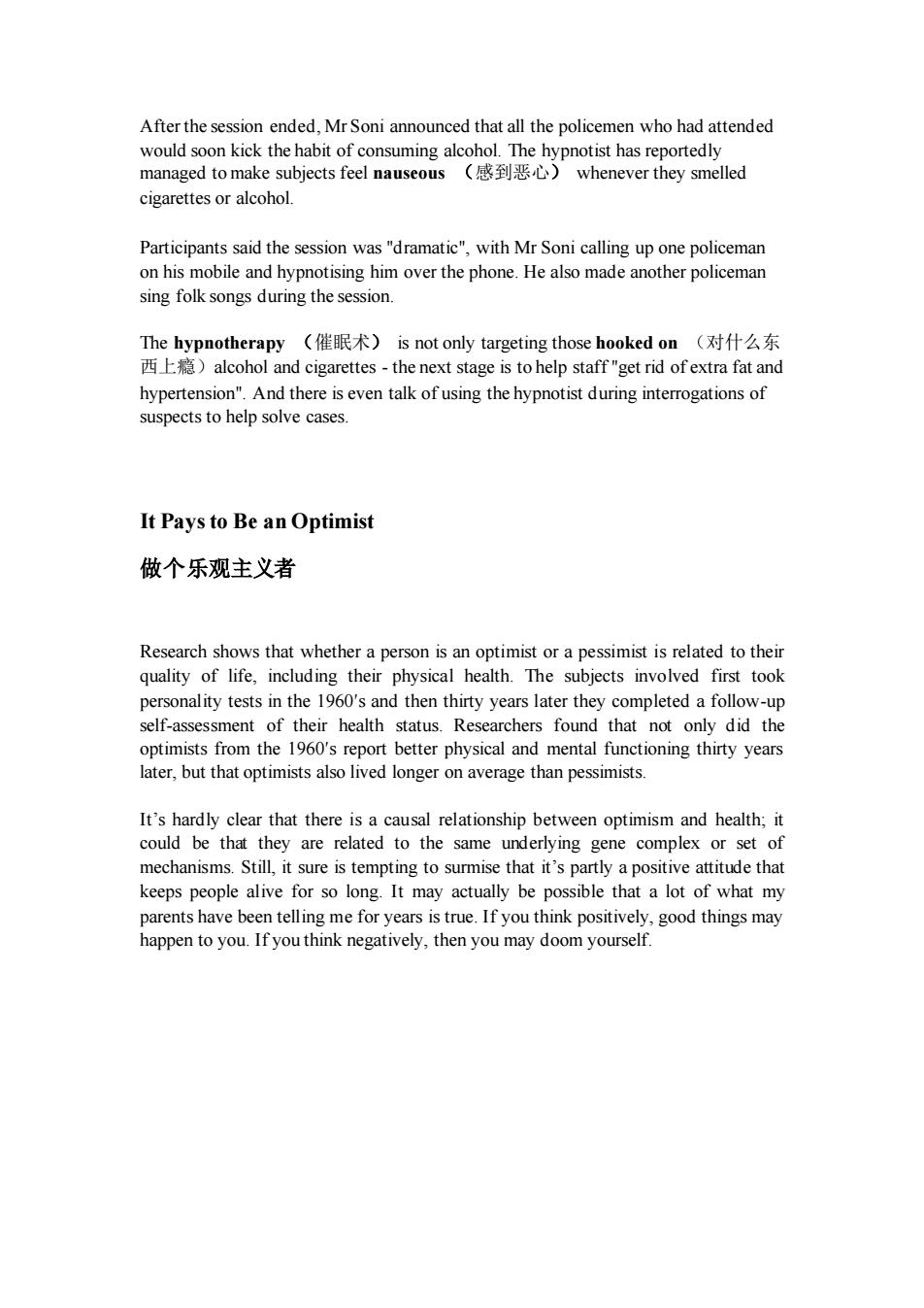
In Silence There Is Healing Psychologist Mary Plouffe makes her living with words:In the life details her patients share,and in the counsel she offers in return.But Plouffe has come to believe that the best opportunities for healing may come when no words are spoken at all. This I believe.People who go into therapy often have a specific reason for being there and an addiction to overcome,a marriage to save,a bad habit to break.But sometimes after a few sessions,the topics run out and patient has nothing to say.It's the moment, THIS I BELIEVE essayist Mary Plouffe is waiting for.She's a therapist and she says her deepest understand ing of her patients often happens without words. I believe in silence.As a clinical psychologist,I spend my day talking.Therapy patients arrive on the hour and we talk.Sometimes the words are powerful, heart-wrenching,devastatingly true.Sometimes. The silences always are.I've come to trust them more,and learned to translate their peculiar language.We speak volumes,you and I,in our silence. There's the silence of fear-fear that fills the space between us as you struggle to convince yourself that the risk of connection is worth taking.I sit a mile away,across a space littered with wounds I can only imagine.But I can imagine,my silence says, and I am still here. There is the silence of withholding.Saying nothing,you convey your disbelief that words could do anything but make things worse.To speak a truth makes it real,and there is no going back.But you are here because you cannot go back,my silence responds. There's the silence of loss that knows no words,for which no words are big enough, or powerful enough or deep enough to convey what only silence can.I step into that devastated interior landscape to witness,silently.If we can stand together long enough,perhaps we can find a way to believe the loss will not kill us both I know the silence that follows just the right words,the ones that fall unbidden from my lips or yours,surprising us both with their astonishingly obvious truth.We collapse into that silence together,breathless.We sit softly in it,letting it surround us with echoes of meaning.The ripples it sends out will await another day for analysis or
In Silence There Is Healing Psychologist Mary Plouffe makes her living with words: In the life details her patients share, and in the counsel she offers in return. But Plouffe has come to believe that the best opportunities for healing may come when no words are spoken at all. This I believe. People who go into therapy often have a specific reason for being there and an addiction to overcome, a marriage to save, a bad habit to break. But sometimes after a few sessions, the topics run out and patient has nothing to say. It's the moment, THIS I BELIEVE essayist Mary Plouffe is waiting for. She's a therapist and she says her deepest understanding of her patients often happens without words. I believe in silence. As a clinical psychologist, I spend my day talking. Therapy patients arrive on the hour and we talk. Sometimes the words are powerful, heart-wrenching, devastatingly true. Sometimes. The silences always are. I’ve come to trust them more, and learned to translate their peculiar language. We speak volumes, you and I, in our silence. There’s the silence of fear — fear that fills the space between us as you struggle to convince yourself that the risk of connection is worth taking. I sit a mile away, across a space littered with wounds I can only imagine. But I can imagine, my silence says, and I am still here. There is the silence of withholding. Saying nothing, you convey your disbelief that words could do anything but make things worse. To speak a truth makes it real, and there is no going back. But you are here because you cannot go back, my silence responds. There’s the silence of loss that knows no words, for which no words are big enough, or powerful enough or deep enough to convey what only silence can. I step into that devastated interior landscape to witness, silently. If we can stand together long enough, perhaps we can find a way to believe the loss will not kill us both. I know the silence that follows just the right words, the ones that fall unbidden from my lips or yours, surprising us both with their astonishingly obvious truth. We collapse into that silence together, breathless. We sit softly in it, letting it surround us with echoes of meaning. The ripples it sends out will await another day for analysis or

exploration.We know the truth now,it binds us together,and in this moment,that is enough. I learned years ago,when I thought music might be my calling,that the notes are only tools.Music is made in the spaces between the notes,the phrasing,the transitions,the silences. So,too,in this world of healing with words.Oh,I work hard at the words.I refine them,and parse them,and shape and color them for each person who shares their story with me.I work at them because they take us to the precipice,to the edge of the truth. But I believe in the silence:The all-knowing and unknowing,devastating silence that exists beyond that precipice.I believe in it because that is where the healing lies. THIS I BELIEVE essayist Mary Plouffe is a clinical psychologist practicing in Maine. Her essay was produced by John Gregory and Dan Gediman.Next week a woman from Wyoming whose hungry childhood produced a life-long drive to achieve.If you'd like to write an essay about the core belief guides your life and submitted to our series.Go to the website thisibelieve.org. The police hypnotist以催眠术除恶习 "You are feeling very sleepy..."These are not words normally addressed to policemen But this might well be the sort of language directed to officers in the central Indian state of Chhattisgarh.Senior officers there have called in a hypnotist (to help their men give up drinking alcohol and smoking. They believe that alcoholism(酗酒现象)has become a problem in the force,.with reports of drunk policemen on duty India's policemen say they are overworked and many suffer from stress.Recently,a local TV channel showed a policeman passing out (after drinking alcohol in the capital,Raipur. So local police hired hypnotist VL Soni for a 30-minute session with around two hundred officers,who were described as "alcoholic,overweight or depressed
exploration. We know the truth now, it binds us together, and in this moment, that is enough. I learned years ago, when I thought music might be my calling, that the notes are only tools. Music is made in the spaces between the notes, the phrasing, the transitions, the silences. So, too, in this world of healing with words. Oh, I work hard at the words. I refine them, and parse them, and shape and color them for each person who shares their story with me. I work at them because they take us to the precipice, to the edge of the truth. But I believe in the silence: The all-knowing and unknowing, devastating silence that exists beyond that precipice. I believe in it because that is where the healing lies. THIS I BELIEVE essayist Mary Plouffe is a clinical psychologist practicing in Maine. Her essay was produced by John Gregory and Dan Gediman. Next week a woman from Wyoming whose hungry childhood produced a life-long drive to achieve. If you'd like to write an essay about the core belief guides your life and submitted to our series. Go to the website thisibelieve.org. The police hypnotist 以催眠术除恶习 "You are feeling very sleepy..." These are not words normally addressed to policemen. But this might well be the sort of language directed to officers in the central Indian state of Chhattisgarh. Senior officers there have called in a hypnotist(催眠师) to help their men give up drinking alcohol and smoking. They believe that alcoholism (酗酒现象)has become a problem in the force, with reports of drunk policemen on duty. India's policemen say they are overworked and many suffer from stress. Recently, a local TV channel showed a policeman passing out (昏厥)after drinking alcohol in the capital, Raipur. So local police hired hypnotist VL Soni for a 30-minute session with around two hundred officers, who were described as "alcoholic, overweight or depressed

After the session ended,Mr Soni announced that all the policemen who had attended would soon kick the habit of consuming alcohol.The hypnotist has reportedly managed to make subjects feel nauseous(感到恶心)whenever they smelled cigarettes or alcohol. Participants said the session was "dramatic",with Mr Soni calling up one policeman on his mobile and hypnotising him over the phone.He also made another policeman sing folk songs during the session. The hypnotherapy(催眠术)is not only targeting those hooked on(对什么东 alcohol and cigarettes-the next stage is to help staff"get rid of extra fat and hypertension".And there is even talk of using the hypnotist during interrogations of suspects to help solve cases. It Pays to Be an Optimist 做个乐观主义者 Research shows that whether a person is an optimist or a pessimist is related to their quality of life,including their physical health.The subjects involved first took personality tests in the 1960's and then thirty years later they completed a follow-up self-assessment of their health status.Researchers found that not only did the optimists from the 1960's report better physical and mental functioning thirty years later,but that optimists also lived longer on average than pessimists. It's hardly clear that there is a causal relationship between optimism and health;it could be that they are related to the same underlying gene complex or set of mechanisms.Still,it sure is tempting to surmise that it's partly a positive attitude that keeps people alive for so long.It may actually be possible that a lot of what my parents have been telling me for years is true.If you think positively,good things may happen to you.If you think negatively,then you may doom yourself
After the session ended, Mr Soni announced that all the policemen who had attended would soon kick the habit of consuming alcohol. The hypnotist has reportedly managed to make subjects feel nauseous (感到恶心) whenever they smelled cigarettes or alcohol. Participants said the session was "dramatic", with Mr Soni calling up one policeman on his mobile and hypnotising him over the phone. He also made another policeman sing folk songs during the session. The hypnotherapy (催眠术) is not only targeting those hooked on (对什么东 西上瘾)alcohol and cigarettes - the next stage is to help staff "get rid of extra fat and hypertension". And there is even talk of using the hypnotist during interrogations of suspects to help solve cases. It Pays to Be an Optimist 做个乐观主义者 Research shows that whether a person is an optimist or a pessimist is related to their quality of life, including their physical health. The subjects involved first took personality tests in the 1960′s and then thirty years later they completed a follow-up self-assessment of their health status. Researchers found that not only did the optimists from the 1960′s report better physical and mental functioning thirty years later, but that optimists also lived longer on average than pessimists. It’s hardly clear that there is a causal relationship between optimism and health; it could be that they are related to the same underlying gene complex or set of mechanisms. Still, it sure is tempting to surmise that it’s partly a positive attitude that keeps people alive for so long. It may actually be possible that a lot of what my parents have been telling me for years is true. If you think positively, good things may happen to you. If you think negatively, then you may doom yourself